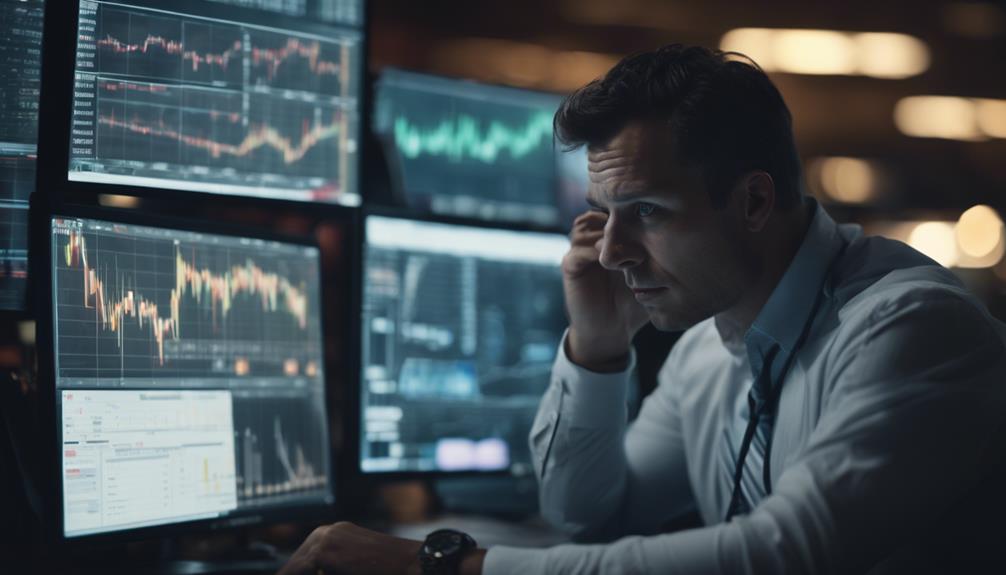In trading, a trader's mind is like a stormy ocean, affected by hidden forces and changing winds. It's important to understand the patterns that drive decision-making for success in the financial markets.
Emotions, fear, and greed all play a big role in how trades turn out. Traders also have to deal with biases, following the crowd, being too sure of themselves, and facing mental challenges.
Finding ways to handle these issues is key to doing well and making money in the long run.
The Role of Emotions in Trading

Emotions have a big impact on how traders make decisions and how well they do in the market. It's important for traders to control their emotions when trading. When traders can manage their emotions well, they can make smart decisions based on analyzing the market instead of acting on impulse. This skill of controlling emotions is crucial for keeping a clear head when the market is volatile or when unexpected things happen.
Mindful trading means being fully focused and aware of your thoughts and emotions when making trading decisions. By practicing mindfulness, traders can see their emotions without letting them take over, which helps them make more objective decisions. This approach helps avoid emotional biases that can lead to costly mistakes.
Improving emotional intelligence and practicing mindfulness in trading can lead to better performance and consistency in navigating the complexities of the market. Traders who focus on controlling their emotions and practicing mindful trading are in a better position to adjust to changes in the market and stick to their strategies.
Cognitive Biases and Decision-making
When traders are making decisions about trading, they sometimes make mistakes because of how their brains work. These mistakes are called cognitive biases, like anchoring bias and confirmation bias.
It's important for traders to know about these biases so they can make better decisions in the unpredictable world of financial markets.
Anchoring Bias Explained
Anchoring bias is a fancy term for a common mistake we make when making decisions. It happens when we rely too much on the first piece of information we hear, even if it mightn't be the best. This can really mess up how traders make choices and lead to not-so-great outcomes.
Here are some things to know about anchoring bias:
- First impressions matter: The first info we get can heavily influence our decisions.
- Stubbornness: It's hard for us to change our minds, even when we learn new things.
- Messing with prices: Anchoring can make us think something is worth more or less than it really is, which can mess up how we set prices.
- Beating anchoring: Knowing about this bias and trying to consider different viewpoints can help us make better decisions.
Being aware of anchoring bias can help traders make smarter and more logical choices.
Overcoming Confirmation Bias
To make better decisions, traders should try to overcome something called confirmation bias. This bias can make them see things in a way that's not accurate and lead to bad results. To fight against this bias, traders should avoid making excuses for themselves and ask for feedback from others.
It's important to be okay with not knowing everything; being open-minded lets traders think about different ideas and facts that might challenge what they already think. By understanding that they mightn't always be right and being willing to listen to different opinions, traders can make smarter choices.
It's important to focus on looking at facts objectively rather than just wanting to be right all the time. To beat confirmation bias, traders need to keep learning and be ready to change their beliefs when they learn new things.
Impact of Fear and Greed

Fear and greed have a big impact on trading. They can make traders feel really emotional and affect their decisions. Sometimes, traders may act impulsively or irrationally because of these emotions, focusing more on short-term gains than long-term plans. It's important for traders to understand how fear and greed work in the market to be successful.
Here are four important things to remember:
- Emotional Rollercoaster: Fear and greed can make traders feel like they're on a rollercoaster of emotions, which can affect their confidence and decision-making.
- Self-Awareness: It's crucial for traders to be self-aware and recognize when fear or greed is influencing their decisions. This helps them take a step back and rethink their strategies.
- Psychological Warfare: The battle between fear and greed can be like a mental fight, impacting market dynamics and causing changes in prices and trends.
- Market Dynamics: Fear and greed have a big role in shaping how the market behaves, affecting prices, trends, and how investors feel.
Overcoming Overconfidence in Trading
Traders sometimes feel too sure of themselves, which can make them take too many risks and make bad choices. To deal with this, it's important to use strategies that help prevent overconfident trading and focus on managing risks well.
Combatting Overconfident Trading
Being aware of your own limits is really important to avoid making risky trades because of overconfidence. When traders are overconfident, they might take too many risks and break their own trading rules, which can lead to big losses.
To deal with this problem, traders should:
- Look back at their past trades to see if they were being too confident and how it affected their overall performance.
- Have clear goals for their trades, like when to buy and sell, to stop themselves from making quick decisions.
- Use strategies to manage risks, like setting up stop-loss orders, to prevent big losses and protect their money.
- Get advice from experienced traders or friends to get different opinions and challenge any overconfident thoughts they might have.
Managing Risk Effectively
To trade safely, it's important to be smart about risks and know your own habits. Understanding the possible downside of a trade is crucial so you can make smart choices. By carefully looking at the risks involved, you can avoid putting too much at stake and prevent big losses.
Deciding how much money to risk on each trade, known as position sizing, is a key part of managing risks well. It helps you control how much you're exposed to the market and limits potential harm. Being aware of the uncertainties and ups and downs of the market is crucial to avoid being too confident.
Using good risk assessment and position sizing methods can help you trade more confidently and resiliently.
Herd Mentality in the Markets

In the busy stock market, there's a strong force called herd mentality that guides how traders act together, influencing how the market moves. This happens when a group of people all make decisions in the same direction, whether it's a good idea or not.
Here are some simple things to know about herd mentality in the markets:
- Fear and Greed: Traders often act based on feelings like wanting to make money or not wanting to miss out, which can lead to everyone buying or selling at once.
- Following the Crowd: People tend to copy what others are doing, creating a chain reaction where decisions are made because everyone else is doing it, not because it's the best choice.
- Going with the Flow: Sometimes, the desire to fit in can make traders ignore what they know is right and just do what everyone else is doing.
- Market Booms and Busts: Herd mentality can cause prices to go way up or way down quickly, creating bubbles or sudden crashes in the market.
Knowing about herd mentality can help traders make smarter decisions when the market gets crazy.
Strategies for Managing Psychological Challenges
Traders can use helpful strategies to handle the tough feelings that can come with trading stocks. Stress management and coping skills are important for dealing with the highs and lows of trading.
One good idea is to practice mindfulness every day. This can help traders stay focused, aware of their emotions, and make better decisions. By becoming more aware of their thoughts and actions, traders can make smarter choices that are less driven by emotions.
It's also helpful to set boundaries and take breaks when feeling stressed. Talking to mentors, peers, or mental health professionals can offer different viewpoints and support. Taking care of mental health is crucial for traders to do well in the fast-paced trading world.